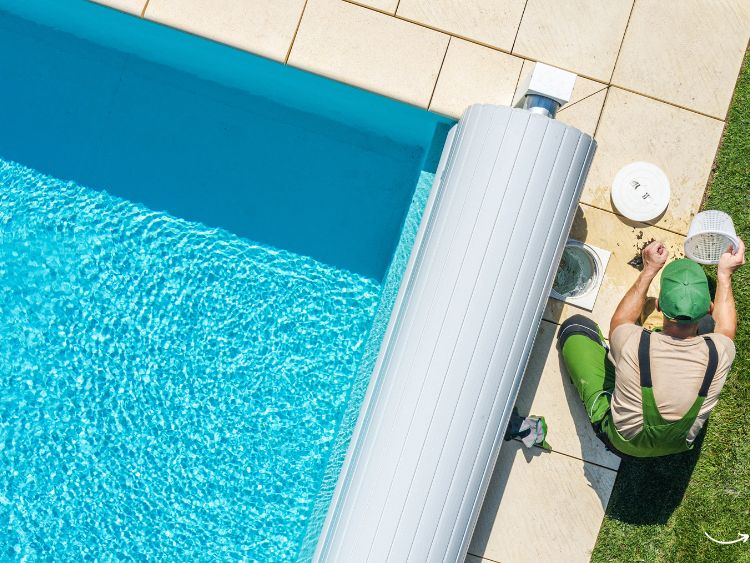Ever wondered what keeps a commercial pool sparkling clean and inviting all year round? It’s not magic, but a well-orchestrated routine of commercial pool maintenance. This guide dives deep into the essentials of maintaining commercial pools, ensuring they remain safe, hygienic, and aesthetically pleasing. Whether you manage a hotel, fitness center, or public swimming pool, understanding the nuances of commercial pool upkeep is crucial. Let’s plunge into the details!
The Importance of Commercial Pool Maintenance
Maintaining a commercial pool goes beyond just keeping the water clear. It involves a comprehensive approach to ensuring safety, compliance with health regulations, and enhancing user experience. Here’s why it’s vital:
- Health and Safety: Regular maintenance prevents the spread of waterborne diseases.
- Aesthetic Appeal: A well-maintained pool attracts more visitors.
- Cost Efficiency: Preventative maintenance reduces the likelihood of expensive repairs.
- Regulatory Compliance: Adhering to local health codes avoids fines and legal issues.
Essential Components of Commercial Pool Maintenance
1. Water Quality Management
Ensuring the water quality in a commercial pool is paramount. This involves regular testing and balancing of chemical levels to maintain safe and clean water. Key aspects include:
- pH Levels: Maintaining a pH level between 7.2 and 7.8 to ensure comfort and safety.
- Chlorine Levels: Keeping chlorine levels between 1.0 and 3.0 ppm to effectively kill bacteria.
- Total Alkalinity: Balancing alkalinity between 80 and 120 ppm to stabilize pH levels.
2. Filtration System Maintenance
The filtration system is the heart of your pool’s cleanliness. Regular inspection and cleaning of filters ensure they function efficiently. Consider the following:
- Backwashing: Regularly backwash sand and DE filters to remove debris.
- Cartridge Cleaning: Clean or replace cartridge filters as needed.
- Pump Inspection: Check the pump for any signs of wear or damage.
3. Routine Cleaning
Keeping the pool and its surroundings clean is crucial for safety and appeal. Routine cleaning tasks include:
- Skimming: Daily removal of debris from the water surface.
- Vacuuming: Weekly vacuuming to remove debris from the pool floor.
- Brushing: Regular brushing of pool walls to prevent algae buildup.
4. Equipment Checks
Ensuring that all pool equipment is in good working condition is a key part of commercial pool maintenance. This includes:
- Heater Maintenance: Regular checks to ensure the heater operates efficiently.
- Lighting Inspection: Ensuring all pool lights are functional and safe.
- Safety Equipment: Regularly inspect life rings, ropes, and other safety gear.
5. Seasonal Maintenance
Different seasons require different maintenance routines. Here’s a quick seasonal breakdown:
- Spring: Open the pool, inspect all equipment, and perform a deep clean.
- Summer: Increase frequency of chemical testing and cleaning due to higher usage.
- Fall: Begin to reduce pool usage and prepare for closing.
- Winter: Properly close the pool to protect it from harsh weather.
Best Practices for Commercial Pool Maintenance
- Create a Maintenance Schedule: Develop a daily, weekly, and monthly checklist to ensure all tasks are covered.
- Employee Training: Train staff on proper maintenance techniques and safety protocols.
- Record Keeping: Maintain detailed records of all maintenance activities for regulatory compliance.
- Professional Inspections: Schedule regular inspections by pool maintenance professionals.
Common Issues and Troubleshooting
Even with diligent maintenance, issues can arise. Here are some common problems and how to address them:
Cloudy Water
- Causes: Imbalanced chemicals, poor filtration, high swimmer load.
- Solutions: Test and balance chemicals, clean or replace filters, reduce swimmer load.
Algae Growth
- Causes: Poor sanitation, inadequate circulation, low chlorine levels.
- Solutions: Shock the pool, brush affected areas, increase chlorine levels.
Equipment Malfunctions
- Causes: Wear and tear, lack of maintenance, incorrect usage.
- Solutions: Regularly inspect and maintain equipment, replace faulty parts promptly.
FAQs About Commercial Pool Maintenance
How often should commercial pools be tested?
Commercial pools should be tested at least twice a day. High usage may require more frequent testing.
What is the ideal pH level for a commercial pool?
The ideal pH level is between 7.2 and 7.8. This range ensures comfort for swimmers and effective chlorine performance.
How can I prevent algae in my pool?
Regular brushing, maintaining proper chlorine levels, and ensuring good circulation can prevent algae growth.
What should I do if the pool water becomes cloudy?
Check and balance the chemical levels, clean or replace filters, and ensure the filtration system is working correctly.
How often should the pool filters be cleaned?
Sand and DE filters should be backwashed every 1-2 weeks, while cartridge filters should be cleaned or replaced as needed.
Conclusion
Commercial pool maintenance is a continuous process that requires attention to detail and a proactive approach. By adhering to the best practices outlined in this guide, you can ensure your pool remains a safe, clean, and inviting space for all users. Remember, the key to successful pool maintenance lies in consistency and diligence.
Authoritative Links
- https://www.cdc.gov/healthywater/swimming/index.html
- https://www.poolsafely.gov
- https://www.redcross.org/take-a-class/swimming/swimming-safety
- https://www.apsp.org/standards-and-codes
Incorporating these practices will not only keep your commercial pool in top condition but also enhance the overall experience for your guests. Dive into effective maintenance, and enjoy the rewards of a pristine pool!



